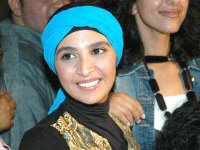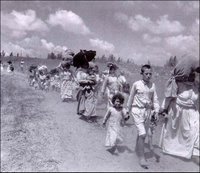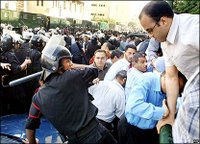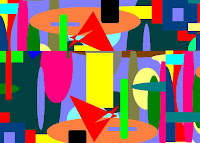The Hijab: The Pathway to Fame?
I watched with great interest yesterday the weekly program on LBC, الحدث ("The Event"). The program, hosted by Shada Omar, discusses issues of interest to Lebanon and the Arab region including those related to politics, economics, and society at large. Yesterday's show focused on what the producers called a "new trend" on the small and big screen in the Arab world: actresses, singers, presenters, and news anchors donning the Islamic headdress, the hijab. The topic of the show was not whether hijab is a requirement for Muslim women, but whether the decisions of various popular female personalities to dress this way was driven by a quest for more popularity and fame. Without a doubt, it was a heated discussion between the show's guests because the issue involves fame, religion, women, and of course: "the veil".
I'd like to reflect on some of the statements made by the women on the show, and elaborate on the topic of the show without getting into the religious intricacies related to whether hijab is a requirement in Islam and the bigger issue of women & Islam. So please, take this as a disclaimer. I'll try my best to focus on the issue discussed on the LBC show without digressing too much. Also, I will attribute to the guests statements that I recall them making on the show in Arabic and will translate to the best of my abilities in English. This is *not* an English translated transcript for the show, rather my own interpretation of the statements, and I will try to make it clear when I'm putting my own thoughts and when they are the speakers' own words (from my memory).
The show featured three female guests: Khadija Ben Guenna, senior AlJazeera news anchor & presenter; Mona Abdel-Ghani, Egyptian actress & singer; and Iqbal Barakah, editor-in-chief of the Egyptian women's magazine "Hawwa". Khadija and Mona chose to begin wearing the hijab in the past few years and have fervently defended their decision to do so as a personal matter. Of course, women like these two who became "household names" initially gained a lot of media attention for donning the hijab, considered a "controversial" issue for some people. Most female artists in the Arab world who choose to make this decision usually put an end to their acting or singing careers and choose to remain out of the spotlight for a few years, although some return to host Islamic oriented shows or play less scandalous roles in TV series or movies.
Iqbal Baraka, who repeatedly nagged about authoring a new book on the subject, acc
 used Ben Guenna and Abdel Ghani and other popular female figures of choosing to wear the hijab in order to gain attention and fame. She argued that these women represented a "dangerous" trend that "pressured" women across the Arab world to follow in their footsteps and take on this "radical" step, which she believes is not required by Islam. At one point she said, "I don't want to learn my religion from a women who just decided to wear the hijab and who probably knows less than I do about Islam. She's not a scholar, yet when she dons the headscarf, people treat her like she is. She receives offers to host religious programs and is instantly on the cover of popular magazines across the region." In my view, Baraka came off as unprofessional and simply weak in her argument because she resorted to personal attacks (see below) and ignorant generalizations.
used Ben Guenna and Abdel Ghani and other popular female figures of choosing to wear the hijab in order to gain attention and fame. She argued that these women represented a "dangerous" trend that "pressured" women across the Arab world to follow in their footsteps and take on this "radical" step, which she believes is not required by Islam. At one point she said, "I don't want to learn my religion from a women who just decided to wear the hijab and who probably knows less than I do about Islam. She's not a scholar, yet when she dons the headscarf, people treat her like she is. She receives offers to host religious programs and is instantly on the cover of popular magazines across the region." In my view, Baraka came off as unprofessional and simply weak in her argument because she resorted to personal attacks (see below) and ignorant generalizations.Khadija Ben Guenna was the most eloquent of all, as I had imagined she would be. She spoke using sound arguments, and defended herself not by attacking others, but by using pure logic. She wondered why people made a huge fuss about her personal decision to wear the hijab, which she said was rooted in personal conviction and without any desire for fame. She bluntly told Baraka that she was a well-respected and popular news anchor before she wore the hijab, so she didn't need to wear a headscarf to gain attention. Khadija added that she had expected to be
 faced with a negative reaction and prepared herself for this challenge, but was now being accused of having ulterior motives for her choice of dress. Directing her question to Baraka, Ben Guenna asked "why some women who claim to champion women's rights seek to constrain other women like herself from practicing their religion freely, a right that is guaranteed in Article 18 of the Universal Declaration of Human Rights?" She also mentioned that ban on the headscarf that countries such as Turkey and France have in place which cause significant challenges for many Muslim women. This includes herself as she experienced this scrutiny when she was assigned to interview French Foreign Minister Dominique de Villepin whose country recently decided to ban the hijab in state schools. Ben Guenna added, "In many Muslim countries today, Muslim women wearing the headscarf represent a majority. If television and art is a representation of popular culture, shouldn't these millions of modestly dressed women be entitled to a handful of females on television screens who 'represent' them?! Is it too much to ask for some representation?" I think not.
faced with a negative reaction and prepared herself for this challenge, but was now being accused of having ulterior motives for her choice of dress. Directing her question to Baraka, Ben Guenna asked "why some women who claim to champion women's rights seek to constrain other women like herself from practicing their religion freely, a right that is guaranteed in Article 18 of the Universal Declaration of Human Rights?" She also mentioned that ban on the headscarf that countries such as Turkey and France have in place which cause significant challenges for many Muslim women. This includes herself as she experienced this scrutiny when she was assigned to interview French Foreign Minister Dominique de Villepin whose country recently decided to ban the hijab in state schools. Ben Guenna added, "In many Muslim countries today, Muslim women wearing the headscarf represent a majority. If television and art is a representation of popular culture, shouldn't these millions of modestly dressed women be entitled to a handful of females on television screens who 'represent' them?! Is it too much to ask for some representation?" I think not.
Mona Abdel Ghani also stated that her hijab was her personal choice and that she did not accept this generalization about the motives of actresses like her who had begun wearing the hijab. She bothered me a little because she kept interrupting the guests and didn't speak as eloquently as Ben Guenna, but then again the latter is a respected and well-educated journalist whose job depends on her ability to speak publicly. (This article gives a better idea of Mona's thoughts on her hijab decision).
Hanan Turk, one of the most popular actresses in the Arab world today, also appeared on the show via phone as she confirmed rumors that she had decided to wear the hijab in the past few days. Asked by the show's host for the reasons why she had made this decision at this point in time, Hanan confidently responded saying that she had been "considering this issue for years now" and that Allah had finally given her "t
 he strength to take this step." Is this a temporary thing or your final decision? asked the host. Hanan said that she had taken this decision with "full conviction" that it was something she was "required to do by her religion as a Muslim woman" and that she "prayed to Allah to help her remain steadfast and patient." She said that she is not stopping her acting career, and is in the midst of taping the series "Awlad Shawari3" produced by Dubai TV. As soon as the call with Turk ended, Iqbal Baraka began attacking her, sarcastically saying "Thank you Hanan for that wonderfully crafted speech which I can see took you a long time to memorize and practice. Now that you are such a religious and spiritual person, you can keep regurgitating these lines all over television shows and in other interviews." How much more childish could Baraka get?
he strength to take this step." Is this a temporary thing or your final decision? asked the host. Hanan said that she had taken this decision with "full conviction" that it was something she was "required to do by her religion as a Muslim woman" and that she "prayed to Allah to help her remain steadfast and patient." She said that she is not stopping her acting career, and is in the midst of taping the series "Awlad Shawari3" produced by Dubai TV. As soon as the call with Turk ended, Iqbal Baraka began attacking her, sarcastically saying "Thank you Hanan for that wonderfully crafted speech which I can see took you a long time to memorize and practice. Now that you are such a religious and spiritual person, you can keep regurgitating these lines all over television shows and in other interviews." How much more childish could Baraka get?In any case, I found the discussion to be insightful especially because it was not just another show that attempted to delve into the scriptural details of the obligation of modesty in Islam. This type of discussion usually gets out of hand and defeats the purpose as most guests on such shows loose their temper and begin hurling insults at one another.
My personal view on the whole subject can be narrowed down to a few rather simple points:
1. Women, Muslim or not, should have the right to dress in any way they want without being intimidated or discriminated against. Whether it is a headscarf, yarmulke, or sari, such choices are personal and should be respected especially when they are a manifestation of an individual's religious beliefs. These decisions do not threaten the freedoms of others and therefore should not be scrutinized and/or jeopardized.
2. The decisions of women to put on or remove the hijab is a personal, regardless of whether they are public figures or not. In Islam, the belief is that individuals will be judged for their actions and intentions, the latter of which can only be determined by Allah. Therefore, speculations about the reasons why a news anchor wears a headscarf are simply that: speculations. Whether I agree or disagree with the individual's choice, I should not be allowed to prevent them from making that choice.
3. Feminists and others who's goal is to champion women's rights should be the first to defend a Muslim woman's right to wear a headscarf. As long as it is a personal choice and not one that is forced by any other individual, then there should not be any consternation about it. Islam itself is a religion that does not advocate any compulsion with regards to religious duties, "Let there be no compulsion in religion" 2:256. The idea that women who did not wear it before, especially those who are educated professionals such as Ben Guenna, are forced to wear it is absurd.
4. If anyone is pressuring young girls in the Arab world to dress a certain way it is the dozens of scandalously-clad-cheap-looking-hoe-like "pop stars" who's skirts keep inching higher and tops inching lower. Their images are plastered on billboards and music videos are incessantly replayed across every TV screen in the Middle East. The idea that modestly dressed women on a few religiously oriented programs and possibly a news anchor or two are "pressuring" young girls in the Middle East to dress more conservatively is laughable. The latter are proving to be role models for young girls, empowering them to educate themselves, and decide if that is a step they would want to take. On the other hand, the Haifa Wahbi type wardrobe sits in the windows of boutiques and malls across Egypt, Jordan, and Saudi Arabia, luring young girls to show as much skin as possible, inevitably turning some girls into the sex-symbols that feminists should be speaking out against.
5. The real pressure is also on news anchors, presenters, and even other singers who choose to remain somewhat descent when they appear on our television screens. Whether they are threatened with losing their job for choosing to wear a headscarf or refusing to wear a tighter shirt and shorter skirt, women in all fields and especially those public ones are losing this freedom of choice. As long as her way of dressing does not get in the way of completing her job, then women should not be harassed to wear or not to wear the hijab or any other article of clothing.
Clearly, this subject is larger than one single post, and I may come back to it because it has been deemed so "controversial" in recent times, an argument I simply don't buy. The root of the issue is freedom of choice, which should be respected by all to avoid discrimination against certain segments of society who wish to fulfill certain religious or moral obligations. Intentions of individuals are theirs alone, and whether we believe they are pure or not, does not entitle us to discriminate against them, especially in the work force and education sector. Preventing women from getting an education because of their dress does not liberate them and will only help to promote ignorance and oppression.
I'd like to see the energy used on debating the hijab focused on more pressing issues facing women in the Middle East such as lack of access to education, discrimination in the workforce, domestic abuse, health problems, lack of political participation, etc. I don't like double standards. A woman's choice is a woman's choice, whether it's considered "liberal", "conservative", "Marxist" or anything in between. Unfortunately, when the spotlight is placed on women's rights in Islam, double-standards, generalizations, and misconceptions are common.
[technorati tags: LBC, hijab, Islam, Khadija Ben Guenna, Hanan Turk, Arab World, popular culture, feminism]
Labels: human rights, Islam




























